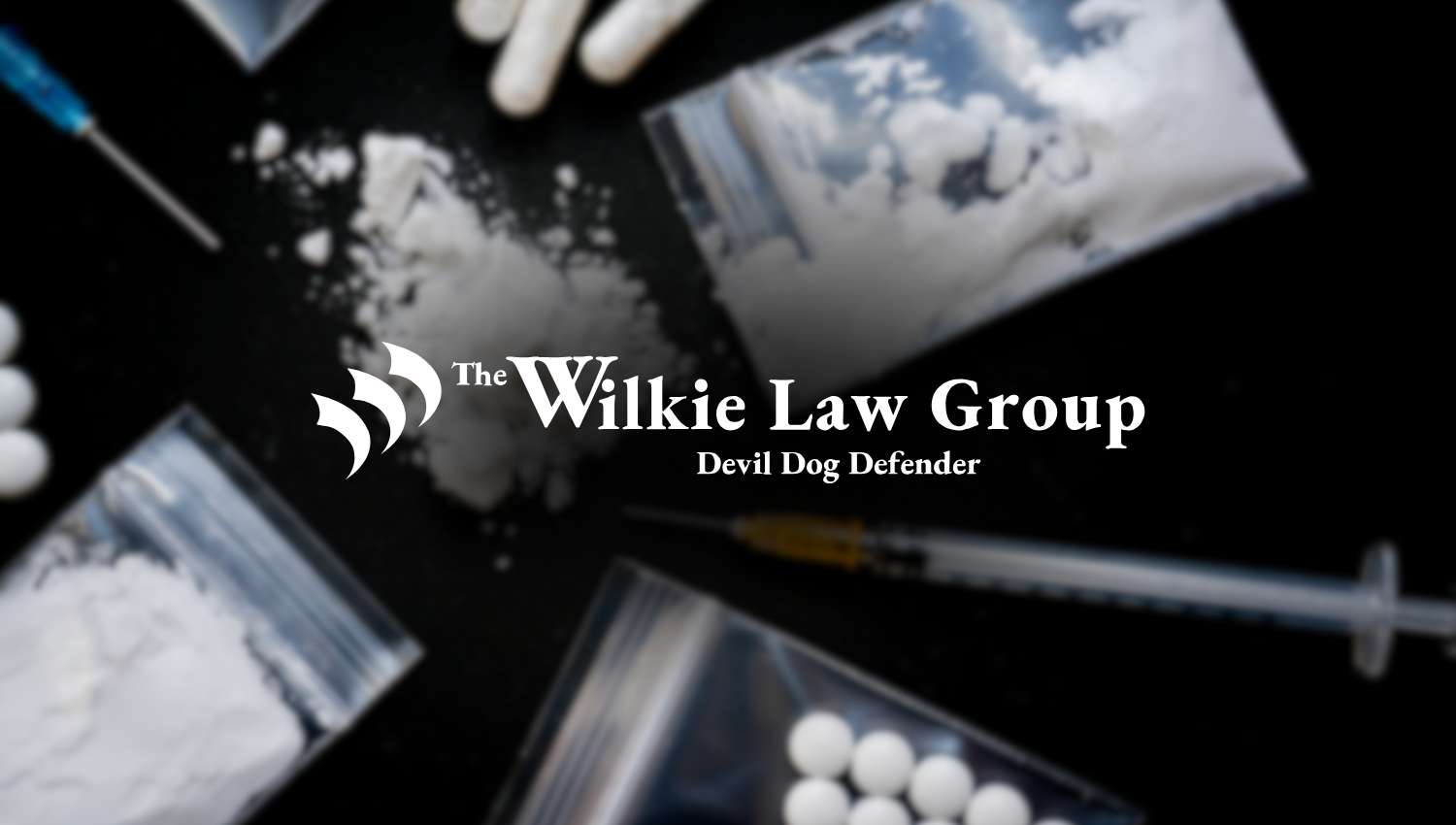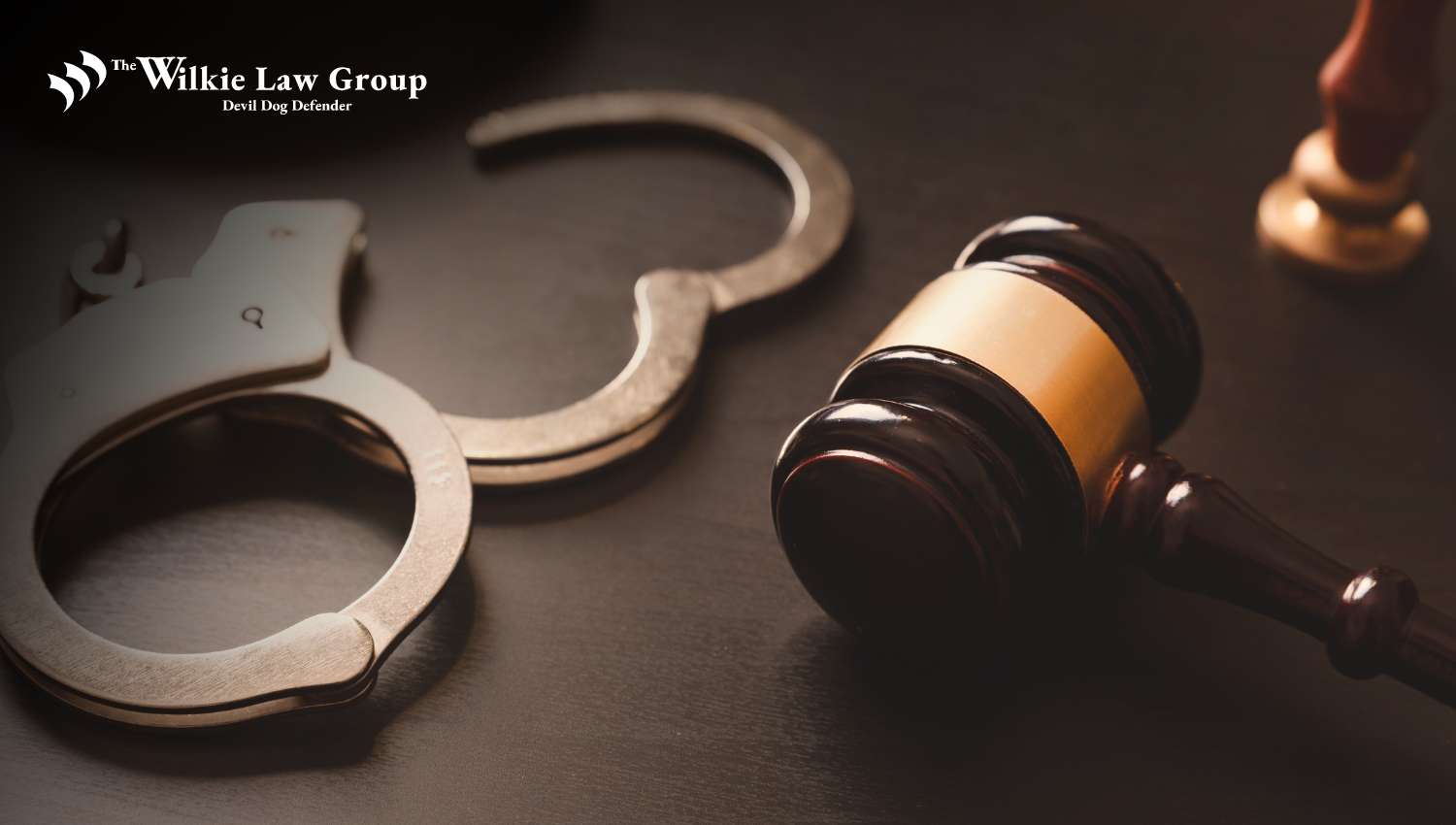Jacksonville, NC Drug Crime Lawyer
Aggressive Drug Crime Attorneys Serving Jacksonville, Wilmington, and Surrounding Areas
Home » Criminal Lawyers » Drug Crimes
Practice Areas
Being charged with a drug offense in North Carolina can turn your entire future upside down, but having an experienced Jacksonville, NC, drug crime lawyer on your side can make a big difference in how your case plays out. At The Wilkie Law Group, attorney Aden Wilkie and his team are dedicated to defending individuals accused of drug crimes in Onslow County and throughout eastern North Carolina.
Whether you’re facing charges for simple possession or a serious felony drug offense, our legal team is committed to building the best defense possible. With years of experience in criminal law and a deep understanding of the local and federal criminal justice system, Aden Wilkie gives each case the personal attention it deserves.
If you are facing criminal charges, don’t wait to reach out. Call (910) 333-9626 or contact us online to speak with a Jacksonville criminal defense attorney who’s ready to fight for your future.

North Carolina Drug Laws
North Carolina’s drug laws are strict and can result in serious penalties depending on the type of substance, amount involved, and the circumstances under which the offense was committed. Prosecutors in Onslow County and across the state aggressively pursue drug charges ranging from simple possession to drug trafficking. At The Wilkie Law Group, our experienced criminal lawyers understand how criminal law applies to each unique case and work to protect the rights of individuals facing drug charges in Jacksonville, NC and the surrounding areas.
Schedules of Controlled Substances
Under the North Carolina Controlled Substances Act, a controlled substance is any drug or chemical that is grouped into one of six categories, called schedules. These schedules are based on things like how addictive the drug is, how it affects the body, how often it’s abused, and the risk it poses to public health. Some drugs are also classified based on whether they can be used to make other illegal drugs.
Here are examples of drugs in each schedule, from Schedule I to Schedule VI:
Schedule I
Schedule I drugs are considered the most dangerous under North Carolina law. These substances have a high risk of abuse and no accepted medical use. Common examples include heroin, LSD, ecstasy, and psychedelic mushrooms.
Schedule II
Schedule II drugs also carry a high potential for abuse, but unlike Schedule I drugs, some of them are used for medical treatment under strict supervision. Examples of Schedule II drugs include cocaine, methamphetamine, fentanyl, and prescription opioids like oxycodone and morphine.
Schedule III
Schedule III drugs are considered to have a moderate potential for abuse and addiction. They are often prescribed by doctors but can still lead to criminal charges if misused. These include anabolic steroids, ketamine, and medications with low doses of codeine.
Schedule IV
Schedule IV drugs have a lower risk of abuse and addiction than drugs in the higher schedules, but they are still controlled substances. These include anti-anxiety medications and sleep aids like Xanax, Valium, Ativan, and Ambien.
Schedule V
Schedule V drugs are the least addictive prescription drugs and often include medications with small amounts of narcotics, like cough syrups that contain codeine. While these are considered less dangerous, illegal possession or distribution can still result in misdemeanor charges and penalties.
Schedule VI
Schedule VI drugs are defined as having a low chance of being abused or causing harm to public health or addiction based on what doctors and researchers know right now. Under North Carolina criminal law, this schedule mainly includes marijuana and THC products. Even though marijuana is legal in other states, it remains illegal for recreational use in North Carolina. Charges involving Schedule VI drugs can range from simple possession to felony distribution, depending on the amount and circumstances.

Types of Drug Crimes our Jacksonville Criminal Defense Lawyers Defend Against
Drug charges in North Carolina can range from simple possession to serious felony offenses like trafficking or manufacturing illegal substances.
At The Wilkie Law Group, our Jacksonville criminal lawyers defend clients against all types of drug crimes in Onslow County. Whether you were arrested with a small amount of marijuana or accused of distributing large quantities of drugs, our legal team is here to build an aggressive defense and fight for your future.
The type of charge you face can affect the penalties, so it’s important to understand the different kinds of drug offenses and how they are treated under North Carolina law.
Simple Drug Possession in NC
Simple possession means being caught with a small amount of drugs for personal use. In North Carolina, this is usually a misdemeanor if it involves a lower-level substance like marijuana, but it can be a felony for drugs like cocaine or heroin. Even a first offense can lead to jail time, fines, and a permanent criminal record.
Our Jacksonville criminal defense lawyers can examine the details of your NC simple possession charge, gather evidence, and poke holes in the prosecution’s story to help you get the case dismissed or reduced.
How Long Do You Go to Jail for Drug Possession in North Carolina?
The amount of jail time for simple drug possession in North Carolina depends on the type of drug involved and your criminal history. For example, if you’re caught with less than half an ounce of marijuana and it’s your first offense, you might only face a fine with no jail time. However, possession of drugs like cocaine or meth may result in felony charges and months or even years behind bars.
The penalties for drug possession become much more serious if you have a prior criminal record, especially one that includes violent crimes. Even if the current charge seems minor, a history of past convictions can lead to longer jail time and higher fines. Prosecutors often use prior offenses to argue for stricter punishment, especially if the charges involve drugs or violent crimes.
Drug Trafficking & Distribution in NC
Drug trafficking charges in NC involve selling, transporting, or possesing illegal drugs like marijuana, cocaine, heroin, meth, LSD, or MDMA. To convict someone of a drug trafficking offense, the prosecution must prove beyond a reasonable doubt that they intentionally possessed the drugs and planned to sell or deliver them.
If you are caught with the following amounts of controlled substances, you could be arrested for drug trafficking:
- 10 pounds of marijuana
- 28 grams of cocaine
- 28 grams of methamphetamines
- 4 grams of heroin/other opioids
- 100 units of LSD
- 28 grams of MDMA (ecstasy)
Because drug trafficking is a felony, a conviction could carry years in prison and significant fines. It can also affect your job, housing, and future opportunities long after you’ve served your time. That’s why it’s so important to have a Jacksonville, NC, drug crime lawyer who can challenge the evidence against you and work toward the best possible outcome for your case.
Manufacturing Controlled Substances in NC
Manufacturing drugs means making, preparing, or packaging illegal substances. This can include growing marijuana plants, running a meth lab, or mixing chemicals to create synthetic drugs.
Under North Carolina criminal law, manufacturing controlled substances is a felony offense that can lead to serious consequences, including years in prison and a permanent criminal record. In many cases, people charged with drug manufacturing also face additional charges, such as possession with intent to distribute, trafficking, or operating a drug house or vehicle. These charges also carry harsh penalties and can impact every part of your life—from your job to your ability to find housing.
If you’ve been accused of drug manufacturing, it’s essential to speak with a knowledgeable criminal defense lawyer right away. An experienced Jacksonville drug crime lawyer like Aden Wilkie will build a strong defense to protect your rights and reputation.

NC Drug Crime FAQs
What are North Carolina’s CBD Laws?
As of 2025, CBD products are legal in North Carolina as long as they are made from hemp and contain no more than 0.3% THC. This follows federal law under the 2018 Farm Bill, which legalized hemp-derived CBD products that meet this standard. However, marijuana-derived CBD and any product with more than 0.3% THC are still illegal in North Carolina.
Is LSD Illegal in NC?
Yes, LSD is illegal in North Carolina. It's classified as a Schedule I controlled substance, meaning it has no accepted medical use and a high potential for abuse. Possessing, selling, or manufacturing LSD can result in felony charges with hefty fines and up to ten years in prison.
How Much Weed is a Felony in NC?
Possessing more than 1.5 ounces of marijuana is classified as a Class I felony. A first-time offender could face 3 to 8 months in prison and fines up to $1,000. However, you could serve up to 12 months if you have prior convictions.
How Much Cocaine is a Felony in NC?
In North Carolina, possessing any amount of cocaine is a felony. This is because cocaine is classified as a Schedule II controlled substance. Even having less than one gram can result in a Class I felony, which may lead to 6 to 12 months in prison. The more cocaine involved, the more serious the charges become.
Can I Be Arrested for Drug Possession If the Drugs Weren’t Mine?
There are two types of drug possession charges: actual possession and constructive possession. Actual possession means the drugs were found directly on your person, like in your hand, pocket, or bag, and you had full control over them. Constructive possession means the drugs were not physically on you, but they were in a place you had access to or control over, such as your car, home, or shared space. This means, even if the drugs weren’t yours, you can still be charged if law enforcement believes you knew about them and had the ability to control them.
If you're facing either type of drug possession charges, criminal defense attorney Aden Wilkie can step in to protect your rights and help prevent a guilty verdict. He will examine whether law enforcement followed the law during your arrest or search and whether your rights were violated at any point during the investigation. He’ll look closely at the prosecution’s evidence, questioning things like who actually owned the drugs, whether your fingerprints were found, or if other people also had access to the area. His goal is to raise reasonable doubt and fight for the best possible outcome in your case.
What are the Penalties for First-Time Drug Offenders in NC?
In North Carolina, first-time drug offenders may have access to alternative sentencing options focused on rehabilitation rather than punishment.
The 90-96 Conditional Discharge Program gives certain first-time drug offenders a chance to avoid a conviction by completing court-ordered conditions. This program is available to people charged with low-level drug offenses who have no prior convictions. Instead of going to jail or paying heavy fines, eligible individuals may be placed on probation and required to complete a drug education program, attend counseling, do community service, or take drug tests.
If all conditions are met, the charge can be dismissed, and the person may qualify for expungement to clear their record. It's important to note that eligibility and program specifics can vary, so consulting with a Jacksonville, NC expungement lawyer is essential to determine the best course of action for your situation.
Can a Drug Charge Be Expunged in North Carolina?
Yes, a drug charge can be expunged, but it depends on the details of your case and your criminal history. Under North Carolina's Second Chance Act, you may be eligible for immediate expungement if your criminal charges were dismissed or you were found not guilty.
For first-time nonviolent drug convictions, expungement is possible after a waiting period of 5 years for a single misdemeanor, 7 years for multiple misdemeanors, and 10 years for one nonviolent felony. During that time, you must stay out of legal trouble and complete all sentencing, including probation.
What Happens if a Minor Gets Caught With Drugs?
When a minor is caught with drugs, the case is typically handled within the juvenile justice system, which emphasizes rehabilitation over penalization.
The specific consequences depend on factors like the minor's age, the type and amount of drug involved, and any prior offenses. Potential outcomes include participation in diversion programs (such as counseling or community service), probation, or, in more serious cases, time in a juvenile detention facility.
For repeat or severe offenses, a judge might decide to transfer the criminal case to adult court, which could result in harsher penalties.

Penalties for North Carolina Drug Crime Convictions
Drug crimes in North Carolina can be charged as either a misdemeanor or a felony, depending on the details of the case. The type of controlled substance, how much you had, and your criminal record all play a part in how the charges are classified and what penalties you might face.
If you’re caught with a small amount of a drug like marijuana and there’s no sign you were trying to sell or distribute it, you’ll likely be charged with simple possession, which is a misdemeanor. Misdemeanor drug charges typically result in fines, probation, or community service, but they still go on your criminal record. Sometimes, a judge may also order jail time, especially if prior offenses or other aggravating factors exist.
If you are found to have a large amount of marijuana and law enforcement believes you were selling, trafficking, or manufacturing it, the charge can be raised to a felony. Some drugs—such as cocaine, heroin, and ecstasy—are handled even more seriously under North Carolina criminal law. Simply being in possession of these substances is usually charged as an automatic felony, no matter how much you had or if it’s your first offense.
Why Choose Aden Wilkie as Your Jacksonville Drug Crime Lawyer?
With years of experience handling military court martials and civilian criminal cases, our law firm understands what’s at stake when you’re facing a drug offense in North Carolina. No matter the charge, Jacksonville drug crime lawyer Aden Wilkie will carefully review the details of your situation and build a strong case focused on challenging the evidence and protecting your rights.
We take pride in offering clear guidance, honest advice, and aggressive representation to help our clients move forward. When you choose The Wilkie Law Group, you’re choosing a legal team that will represent you with dedication and fight for the best possible outcome in your case.

Call The Wilkie Law Group to Speak With a Private Criminal Defense Attorney in Jacksonville, NC Today
If you’re facing serious legal matters in North Carolina, choosing the right attorney can make a big difference—and Aden Wilkie is the one you want in your corner.
As a former U.S. Marine turned civilian criminal defense attorney, he understands the unique challenges that both civilians and service members face and brings that same discipline and determination to every case, making him a strong choice for anyone facing drug charges, whether on or off base.
Aden Wilkie is a strong advocate for his clients, providing aggressive defense strategies while offering support and guidance through every step of the process. If you’re looking for a Jacksonville drug crime lawyer who truly understands what’s at stake, Aden Wilkie is the guy for you.
Your Trusted Jacksonville Criminal Defense Attorney
Drug charges can have a serious impact on your future, but The Wilkie Law Group is here for you. Our team has years of experience helping clients with misdemeanor and felony criminal cases. When you work with an Onslow County criminal defense attorney from our law firm, you get dedicated support, honest advice, and a strong legal strategy focused on protecting your rights.
For all your criminal defense and family law matters in the Jacksonville, NC area, call our law firm at (910) 333-9626 or contact us online to schedule a consultation today!
